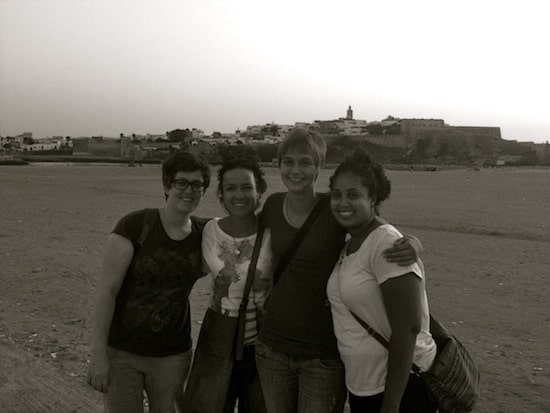Moroccan Culture and Somewhat Secret Love Affairs


I was lying on my bed, watching Rachel Maddow and minding my own business, when my sister comes in to tell me she’s going out. Would I like to come? It should tell you something about Morocco at night that I paused Rachel unthinkingly and went with her. It was eleven at night. There were people everywhere. Women sat on the walls around the mosque while their sons played soccer in the courtyard in front of it; a large crowd was gathered in front of some mysterious tent blaring music; the line for grand taxis went around the block. And there on the corner was a mass of teenagers, milling about and trying to look cool. Wafaa stalked up to a pair of boys who were waiting for us.
And as we stood there for twenty minutes, talking, I figured it out. Here were two boys and two girls on a street corner, attempting to share a conversation, but one of us hardly spoke arabic and the other seemed to meld into the background as the conversation went on. It was just my sister and this boy, laughing and talking. They exchanged the kind of intimacies normal to Moroccan conversation–grabbing each other’s hands, punching shoulders. But my Wafaa’s hand always lingered a second longer than appropriate.
When it was over, I employed my best Arabic on her. “Oh, Hamish!” I mocked. “I love you, Hamish! Let’s get married!”
“Stop it!” She was horrified. And then, “Was I that obvious?”
I nodded.
“Don’t tell Mom.” And I didn’t.
Mom was displeased with the inordinate amount of time for which we were gone, and I could see that she wasn’t buying Wafaa’s story, but I easily feigned confusion and skipped on upstairs.
Things went on like this. I became the preferred wingman over our cousin or other sister; my limited Arabic made me both unlikely to snitch and unable to tease above a second grade level. And as I watched it go on, I realized that I hadn’t come in at the beginning of something. This was not a fledgling romance. My sister and this boy had been dancing delicately around this street corner for years. Five years. They were going to get married, my sister assured me. And so I played my small part in their affair and left it at that.
My departure from Morocco mostly involved my constant reassurances to my family that I would return to see them soon. “Winter,” they insisted. I tried to talk them into next year.
“I’ll return for Wafaa’s wedding,” I said with perfect honesty. I want to be there when she marries the man she loves.
“Oh, before that,” my mom scoffed.
Wafaa explained to me later. “We can’t get married,” she said. “I don’t know when. But a wedding is very expensive, and a house–we don’t have the money.”
And finally I understood. How very universal indeed.








